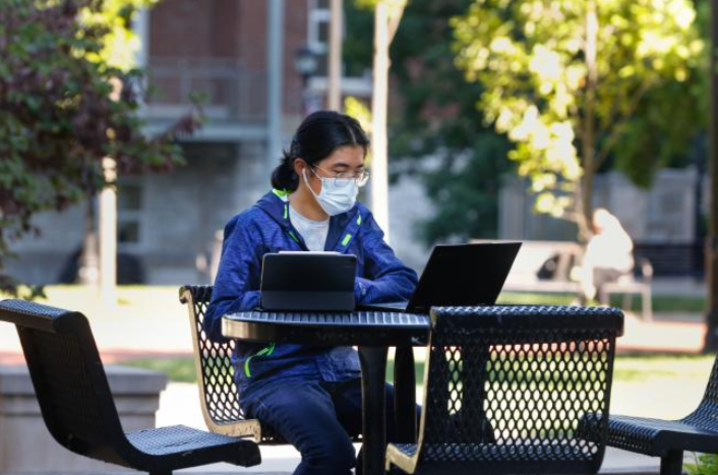Our Plans for Return to In-Person Classes Next Week, Keeping Our Community Safe

President Eli Capilouto
Jan 3, 2022
Campus Community,
As we prepare for a new semester, I want to provide you with details about how we are keeping our community safe, while continuing our vital work together.
At the start of this semester, we know we will experience many more cases of the virus as we continue to offer free testing services for those with symptoms and resume the required weekly testing of unvaccinated faculty, staff and students. We will transition to our spring reporting this week, and you can review the numbers regularly at our COVID-19 data dashboard. The Omicron variant is much more transmissible. It also appears much less likely to cause serious illness for those who are vaccinated, particularly those who have received booster shots — of which we have ample supply. We are still providing plentiful opportunities for everyone on our campus to receive a booster. Sign up for a vaccine or booster here.
Our challenge is to continue ensuring the health and safety of our community, as we have done so well for nearly two years, while also honoring our critical missions of education, research, service and care.
Our return to campus — with students living in residence halls and most of our courses being offered in-person similar to our recent fall semester — remains a priority, even as we will vigilantly monitor the trajectory of the virus and do what needs to be done to protect our community.
Against that backdrop, here’s where we are and what we are planning:
Booster shots are critical: Vaccines are — without question — the best defense against serious illness or hospitalization. And boosters have proven particularly effective against Omicron. Get your booster shot if you haven’t. It’s essential. You can learn more here.
To bolster that effort, we will initiate a booster shot incentive campaign: In the coming days, we will announce details of a booster shot incentive campaign, like what we have conducted previously. We need to push just as hard for booster shots for everyone on our campus as we did for initial vaccinations last year. Stay tuned for more details about this effort.
Based on an initial assessment of our faculty, staff and student population for the spring semester, about 87% of our community is partially or fully vaccinated. More information about that process can be found here.
We will provide more masks for our community: Per the Centers for Disease Control and Prevention (CDC) guidance about the most effective mask wearing protocols, the university has purchased two KN95 masks for everyone who comes to campus. We will be providing more details this week about our plans to distribute these masks to students, faculty and staff, as we have done in previous semesters.
We are adopting the latest isolation protocols as recommended: Specifically, according to the CDC, “People with COVID-19 should isolate for five days, and if they are asymptomatic or their symptoms are resolving (without fever for 24 hours), follow that by five days of wearing a mask when around others to minimize the risk of infecting people they encounter. The change is motivated by science demonstrating that the majority of SARS-CoV-2 transmission occurs early in the course of illness, generally in the 1-2 days prior to onset of symptoms and the 2-3 days after.” You can read more about these protocols here.
We will communicate frequently and adjust as necessary: We plan to meet this week — and regularly throughout the semester — with elected faculty, staff and students; our START team of medical experts and scientists; and a COVID operational advisory group comprised of campus leaders. Deans will also receive an update on our operational status and plans for the semester. These meetings are important ways for me, and others in the administration, to gather feedback and exchange ideas.
This virus is here to stay, at least for the foreseeable future. The goal now is to continue its transition to being a virus that we manage as opposed to one that dominates so much of life.
We will do that through vaccines.
Continued vaccinations — and now booster shots — are essential to our success in that effort and transition. Flu shots also are critically important. Experts expect that the flu will be particularly harsh this season. As such, and as our health care system continues to respond to the pandemic, it's more important than ever to receive your flu shot. You can learn more about locations where flu vaccines are available here.
As a community, we have met every challenge, at every moment, throughout the pandemic. We’ve continued to educate students, conduct vital research, provide critical care and honor our mission as Kentucky’s university.
I know the continued strain and stress of this pandemic has taxed so many of us in ways we never imagined. I’ve been amazed by your work and by the compassion you have for each other and for our community.
We can do this. We will communicate often, be flexible, make changes when necessary and continue our efforts to advance our state in so many ways.
Thank you for all you do.
Eli Capilouto President




